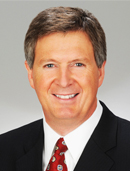© 2013 The Texas Lawbook.
By Jeff Bounds
Contributing Writer for The Texas Lawbook
Alan Schoenbaum is fed up. And he’s not going to take it any more.

Schoenbaum has vowed to fight the patent assertion entities, or PAEs for short, in cases where Rackspace feels that it isn’t infringing on valid patents. Those PAEs are known pejoratively as “patent trolls.”
“It’s like giving money to a protection racket or a pirate,” Schoenbaum says of settling with PAEs. “It’s a game of prisoner’s dilemma – who can get out for the cheapest. It’s a losing game in the long run. We don’t want to play that game any more. If we don’t (fight,) the patent troll industry will continue to get larger.”
Rackspace is one of only a handful of large companies that have gone to the mat with patent assertion entities both publicly and in closed-door negotiations, rather than settling suits. Other vocal critics of patent assertion entities include California-based Cisco Systems, a large maker of networking and telecommunications equipment.
“We did not experience patent troll litigation the first five years of my tenure,” Schoenbaum said. “It’s relatively new. For the first decade, for Rackspace, it was not a problem.”
But it is now, he says. Schoenbaum attributes that partly to Rackspace becoming a bigger target as it has grown. The company is currently or has been a defendant in at least six IP disputes being litigated in the Eastern District of Texas.
Rackspace Legal Dept. Bio:
- Alan Schoenbaum is senior vice president and general counsel
- The San Antonio-based tech company has 24 in-house lawyers on staff worldwide
- Rackspace’s primary outside corporate counsel is Wilson Sonsini
- Rackspace uses Akin Gump, Gardere and Haynes and Boone to handle its IP litigation needs
.
Since 2006, Schoenbaum’s first full year with the business, Rackspace’s annual revenue has climbed from nearly $224 million to more than $1.3 billion. The company has a market value of nearly $5 billion.
The target on Rackspace’s back has also grown in conjunction with the increasing flood of litigation from patent licensing firms nationwide, Schoenbaum said.
Indeed, the number of PAE lawsuits nationwide grew from roughly 465 in 2006 to 2,921 last year, according to data from RPX Corp. and Colleen Chien, an assistant professor at California’s Santa Clara University Law School.
Or, look at it this way: PAEs initiated 19 percent of all U.S. patent suits in 2006. By last year that percentage had grown to 62 percent, data from RPX and Chien show.
“Litigation expense for patent trolls is the single largest patent expense at (Rackspace,) Schoenbaum said. “That’s why it’s a priority for me.”
On average, intellectual property suits will cost anywhere from $3 million to $5 million to go to trial, according to Greg Carr, managing partner of Carr LLP, a boutique intellectual property firm with operations in Frisco and Dallas.

“There are additional issues that have to be addressed that aren’t overlapping,” Carr said. “That’s what causes people to settle, even if they don’t feel the claims are justified.”
And that doesn’t include the potential for things to go the PAEs’ way in court.
Derek Gilliland, a Dallas-based attorney who oversees patent-litigation matters for Nix Patterson & Roach LLP, helped land a $95.8 million jury verdict in March on behalf of a small company in Washington state, reportedly one of the largest such awards in the history of that state. The defendant in that case, San Diego’s Illumina, has promised to appeal, published accounts say.
“When you put forth the effort into what becomes a patent, the Founding Fathers said you should be properly compensated for it,” said Gilliland. He also represents the Plano-based PAE DataTreasury Corp., which has reaped more than $350 million in licensing fees and other income based largely on two patents it controls related to the electronic imaging of checks.

Most cases settle at or before what’s known as the “Markman hearing,” where a judge determines the meaning of a patent’s claim terms and thus the scope of the patent’s coverage, Carr said.
Given the high cost of fighting patent suits, it’s easy to see why most cases settle, according to experts in the field.
“When we were first sued (by PAEs,) we thought, ‘Why were we sued and what is the cost to defend it?’” Schoenbaum said. “We did the logical math that a patent troll wants us to go through. It makes sense to get out for less than the cost to defend (the litigation.)”
The problem, he said, was that other lawsuits soon followed. Rackspace’s chief executive, Lanham Napier, “realized that there wouldn’t be an end,” Schoenbaum said. “We had to do something to stop being the victim of the patent troll predator.”
Blog battle
One of Schoenbaum’s most prominent battles has been with a PAE called Parallel Iron, LLC.
Incorporated in Delaware, Parallel Iron “is the latest in a string of shell companies created to do nothing more than assert patent infringement claims,” according to an amended version of an April 4 lawsuit that Rackspace brought against Parallel Iron in federal court in San Antonio.
Parallel Iron had sued Rackspace and 11 other defendants in Delaware in March in the alleged infringement of 3 patents that Parallel Iron controls, according to court documents. But Rackspace’s subsequent San Antonio suit maintains Parallel Iron’s patent litigation breached a December 2010 written agreement between the two companies to avoid litigation while Rackspace investigated Parallel Iron’s infringement claims, court records say.
Among other things, Rackspace is seeking a court judgment declaring that it does not infringe on the three Parallel Iron patents that are at issue in the case.
The court battle between Rackspace and Parallel Iron is running hand-in-hand with a war of words via blogs between Schoenbaum and Erich Spangenberg, CEO of Dallas-based IP Navigation Group LLC, which is acting as a licensing advisor to Parallel Iron. (IP Navigation is not a law firm, Spangenberg says.)
Schoenbaum, for instance, called Parallel Iron “one of the most notorious patent trolls in America” in an April 4 blog.
“Our goal with this lawsuit is to highlight the tactics that IP (Navigation) uses to divert hard-earned profits and precious capital from American businesses,” Schoenbaum wrote. “This time, the patent troll should pay us.”
Spangenberg responded by posting a series of emails between officials and representatives of IP Navigation Group and Rackspace. The email exchanges purportedly show that the do-not-sue agreement between the companies had expired by February.
“We tried to explain to (Schoenbaum) and Rackspace that his lawsuit was baseless,” Spangenberg’s blog says. “Now we are curious how (Schoenbaum) and Rackspace will explain this exchange … (Schoenbaum,) are you sure you don’t want to dismiss this one?”
In an interview, Spangenberg said he has no personal animosity toward Schoenbaum. “I don’t fully understand what’s motivating him on this one,” he said.
© 2013 The Texas Lawbook. Content of The Texas Lawbook is controlled and protected by specific licensing agreements with our subscribers and under federal copyright laws. Any distribution of this content without the consent of The Texas Lawbook is prohibited.
If you see any inaccuracy in any article in The Texas Lawbook, please contact us. Our goal is content that is 100% true and accurate. Thank you.
